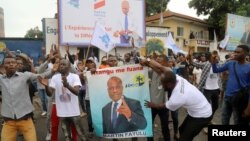Two Congolese opposition leaders on Monday pulled out of a wider deal to support a single candidate in next month's presidential election, seemingly ending hopes of a united front against the handpicked successor to Joseph Kabila.
Felix Tshisekedi and Vital Kamerhe had, alongside other opposition leaders, agreed to give up their candidacies on Sunday after signing an agreement to back businessman Martin Fayulu in the Dec. 23 poll.
That marked a rare moment of unity for Democratic Republic of Congo's splintered opposition, whose infighting in recent years has often played into the hands of Kabila, who has ruled since his father was assassinated in 2001.
But scores of Congolese opposition supporters demonstrated in the capital Kinshasa on Monday against the choice of Fayulu, a former Exxon Mobil manager and businessman, to face off against Kabila's preferred successor, Emmanuel Ramazani Shadary.
Tshisekedi, some of whose supporters burned tyres and branches during the protest, then withdrew his signature in response to "the requests of the party base which did not agree with it," his head of cabinet, Peter Kazadi, told Reuters.
Kamerhe told Reuters the "base was angry" and that had ersuaded him to rethink.
Kabila triggered a political crisis when he refused to quit when his second elected term expired in December 2016, but he surprised many Congolese when he did then agree in August to step down.
December's election, if it goes ahead without incident, would mark the Central African country's first peaceful handover of power since independence from Belgium in 1960.
Several prominent opposition leaders, including former vice president Jean-Pierre Bemba and millionaire businessman Moise Katumbi, were barred by authorities from running - decisions the opposition labelled politically motivated.
Some opposition leaders were willing to stick to Sunday's agreement. One of their number, Freddy Matungulu, urged them to stick together.
"For me withdrawing support for the agreement is not an option, also because I am convinced that no party can win the elections on its own, not even (Tshisekedi's) UDPS," he told Reuters.





